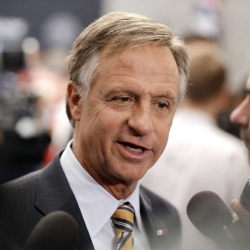In Tennessee, Gov. Bill Haslam (shown right) signed a bill into law which legalizes, regulates, and taxes daily fantasy sports. DraftKings, FanDuel, and other DFS companies have until July 1 to either leave the Tennessee gaming market or apply for a gaming license.
If the companies apply for a license, they would agree to pay an unspecified licensing fee and a 6% tax on their in-state revenues. The requirement to apply for a gaming license might be troublesome for the companies, as it could be seen as a tacit admission that daily fantasy sports is gambling.
Negating Herbert Slatery’s Opinion
The day prior to Haslam’s signing the DFS bill, Tennessee Attorney General Herbert Slatery released an opinion which said that daily fantasy sports was illegal under the current (now previous) laws of the state. Thus, the legislation came in the nick of time, as Slatery’s opinion would have banned DFS gaming in the state.
Tennessee became the third U.S. state to legalize daily fantasy sports. In March 2016, the states of Virginia and Indiana each passed bills which legalized daily fantasy sports. Since a scandal in October 2015 caused the daily fantasy sports industry to become a controversial topic, multiple states have moved to ban DFS gaming: New York, Illinois, Texas, Michigan, Nevada, Florida, and now Alabama.
Luther Strange Bans DFS in Alabama
Alabama Attorney General Luther Strange announced that daily fantasy sports was illegal under Alabama’s current laws. Like in Tennessee, the state legislature would have to pass a bill to legalize DFS gaming.
The consensus opinion is Alabama is much less likely than Tennessee to pass such legilsation. While most US states have state lotteries and are members of the multistate lottery associations, Powerball and Mega Millions, Alabama has yet to pass a state lottery.
In fact, multiple attempts to pass such legislation in the past several years has failed. It is the common thought, if a state cannot pass a lottery bill, it is unlikely to pass a bill on daily fantasy sports.
Luther Strange’s Power to Ban DFS
Other factors complicate the matter in Alabama. Alabama Governor Robert J. Bentley is facing a first-class crisis in retaining power in his stance. Even before the scandal hit, Gov. Bentley had had trouble reining in his own attorney general, Luther Strange.
The two men have been at odds for months over gaming issues, after Gov. Bentley removed Strange’s authority over land-based gambling. The issue stems from Luther Strange’s attempts to ban gaming machines at the state’s non-tribal horse racing tracks, while allowing such gaming to take place at tribal casinos.
Loss of VictoryLand Case
Luther Strange has lost a couple of court cases on the issue, and Judge William Shashy ordered Luther Strange to hand back the gaming machines and confiscated money he took from Milton McGregor’s VictoryLand racetrack a couple of years ago. When Strange refused to comply with the judge’s orders, Bentley stripped Strange of his authority over gaming.
Therefore, AG Strange’s announcement late last week is a further assertion of his authority over gaming, as well as a major flouting of the governor’s late 2015 directive on gaming authority.
DraftKings and FanDuel Comply
Whatever the case, FanDuel and DraftKings were in no mood to defy the Alabama attorney general. Both were given 7 days to process requests for withdrawals from Alabama IP addresses, then told to stop accepting play from those addresses.
To justify his ban, Luther Strange released his own legal statement on his opinion. Strange said, “As Attorney General, it is my duty to uphold Alabama law, including the laws against illegal gambling. The daily fantasy sports operations violate state law because a player stakes something of value on a contest of chance in order to win a prize.”
The opinion continued, “While there is a measure of skill involved in creating a fantasy sports roster, in the end contestants have no control over the performance of the players on their rosters. This activity is illegal under Alabama law.“

